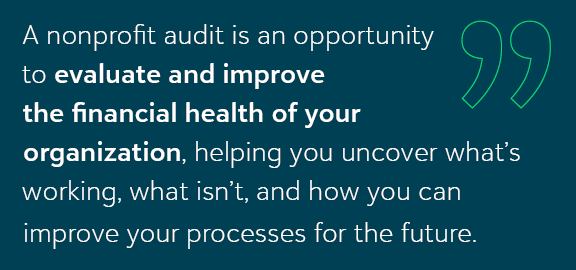Nonprofit Audits: What’s Required in 2025?

Whether mandated by law or undertaken voluntarily, a nonprofit audit can help your finance office get organized and give you a clean slate for the fiscal year.
In this article, we’ll cover key topics and questions related to nonprofit audits, including who they involve, why they’re important, when you might be mandated to conduct one, how much it costs, and more. We’ll also leave you with a comprehensive checklist and a list of resources to help you tackle your next audit with ease!
What Is a Nonprofit Audit?
There are several different types of nonprofit audits, but for the purposes of this article, we’ll focus on financial audits. These audits are the most common type and the biggest undertaking for your team—and they are one of the most important.
A financial nonprofit audit is a comprehensive review of your organization’s financial records, accounts, business transactions, accounting practices, and internal controls, conducted by an independent auditor. Your auditor will ensure that your nonprofit is adhering to generally accepted accounting principles (GAAP) as stated by the Financial Accounting Standards Board (FASB).
A nonprofit audit is an opportunity to evaluate and improve the financial health of your organization, helping you uncover what’s working, what isn’t, and how you can improve your processes for the future.
Working in tandem with a trusted independent auditor, your team in the finance office can successfully verify your financial standing and demonstrate your commitment to transparency. This helps build trust with your donors, signals financial sustainability to funders, and identifies any potential weaknesses in your processes and controls that should be addressed before they become a problem.

Who Needs to Be Involved in a Nonprofit Audit?
A nonprofit audit will include support from your entire financial staff, so it’s best to be prepared ahead of time and know exactly what each key player will be responsible for. You and your internal team will need to select and collaborate with a trusted third-party auditing firm. Take your time interviewing external auditors to ensure that you find the best possible fit. Everyone should work together seamlessly to make the audit as straightforward as possible.
Key players and roles from your internal team include:
- Finance Director/CFO: The primary point of contact and coordinator
- Executive Director: Provides oversight and signs the management representation letter
- Board Treasurer: Reviews the audit findings and presents findings to the full board
- Finance Staff: Gathers documentation and responds to auditor requests
- Program Managers: Available for questions about specific grants or programs
- Audit Committee (if you have one): Oversees the audit process and reviews results
Externally, key players on your selected audit team will include:
- Lead Auditor: Oversees the entire audit process and signs off on the final report
- Staff Auditors: Conduct detailed testing and document review
- Audit Manager: Coordinates between your organization and the audit team
- Audit Partner: Reviews final work and presents to your board
A successful nonprofit audit relies on clear communication and collaboration among all involved. It is essential for every participant—whether internal team member or external auditor—to understand their specific responsibilities. When everyone knows who is responsible for what, the audit process runs more efficiently.
Which Governing Bodies Mandate Nonprofit Audits?
Generally, there are four main reasons why your organization might conduct a nonprofit financial audit. Audits can be initiated by revenue thresholds, internal policies, state laws, and grant applications, among other reasons. Here are some of the most common reasons for nonprofit audits, as well as who is responsible for mandating them.
Internal Mandates
Your nonprofit may have annual audits written into its bylaws to promote financial security and transparency. If recurring audits are not written into your bylaws, your organization still may decide to conduct a voluntary audit to identify and address any issues before an external audit that could arise in the future, or simply to demonstrate to your donors that your organization is in good standing.
State Requirements
Most states require an independent nonprofit audit for organizations if their total revenue or total contributions received in a fiscal year surpass a certain amount. The threshold is state-dependent, so be sure to check your specific state’s requirements. Some states have a lower threshold of contributions/revenue, while some are much higher.
Federal Requirements
If your nonprofit receives $1 million or more of federal funding per year, including federal funding that passes through the state in which your nonprofit operates, then you are required to conduct what’s known as a single audit. A single audit is an organization-wide audit that reviews all financial statements and federal awards to ensure that organizations are using federal funds in compliance with government requirements.
Funders
It’s not uncommon for private grantmakers to require proof of an external audit to be eligible for funding, because they want to ensure the financial health of your nonprofit before they award their grant. For example, a grant application may ask for an audit report in order for your nonprofit to be considered. Some funders accept copies of tax returns or other financial statements, but many will require an independent nonprofit audit.
Nonprofit Audit Requirement Checklist
The formal nonprofit audit process typically starts three to four months before the end of your fiscal year, and the scope of the audit should focus on verifying your financial statements, examining your internal controls, testing significant transactions, and ensuring your nonprofit is compliant with accounting standards.
So, how can your finance office prepare for a successful nonprofit audit? Use the checklist below to familiarize yourself with the process and ensure you’re on track every step of the way.
1. Selecting and coordinating with your auditor
Finding an auditor can take one to three months, and it involves leveraging your network, conducting research, issuing an RFP, and meeting with potential candidates. Once you’ve selected a trusted independent auditor, you’ll need to stay in regular communication with them to inform them of any changes, like if you implement a new fund accounting software, and to make sure you’re all on the same page.
Additionally, you can expect your auditor to send an official engagement letter that outlines the scope, timeline, and fees of the audit.
2. Gather Financial Statements
Next, it’s time to begin the nonprofit audit prep work. During the initial planning phase, your auditor will provide you with a list of required documentation, so you can begin gathering it immediately. Financial statements required typically include:
- Statement of Financial Position (Balance Sheet)
- Statement of Activities (Income Statement)
- Statement of Cash Flows
- Statement of Functional Expenses
- Form 990 tax return
- Prior year audit report and management letter
You may also want to file an extension of Form 990, particularly if your audit is required and you have a deadline to hit. Getting an extension of Form 990 means you won’t have to complete that form and manage the audit process at the same time, and it also means your tax return can reflect any improvements you make based on the findings of the audit.
3. Gather Supporting Documents
In addition to the financial statements, you will likely need to gather a variety of supporting documents, including:
- Bank statements and reconciliations
- Grant agreements and documentation
- Board meeting minutes
- Financial policies and procedures
- Donor records and contribution documentation
- Payroll records and tax filings
- Expense documentation
Add everything to a secure digital folder to share with your auditor so the rest of the audit can run smoothly. You can also attach documentation to related areas within your fund accounting system, so your auditor has access to the files and context within your accounting system.
4. Establish Roles and Expectations
Make sure essential players in the finance office are briefed on their roles and
responsibilities. Internally, your audit team will include the finance director/CFO, executive director, board treasurer, program/grant managers, and other finance staff. Provide training for new members of your team on how the process will work.
Also provide training on your fund accounting system to your auditors so they can access information with minimal oversight. You’ll set up roles and permissions within your fund accounting system, so the auditors only have access to the information they need to see.
5. Respond to Questions and Check in with Your Audit During Fieldwork
No matter how much you plan, your auditor will have questions during the audit. You’ll likely have regular check-ins throughout the audit, but there will be questions between check-ins as your auditor digs into your control systems and documentation. Be prepared to answer them quickly, so they can move forward with the audit.
6. Receiving the Nonprofit Audit Findings
At the end of the process, your auditor will provide you with a draft report detailing their findings. Your team should meet with the auditor team to discuss the findings and your team’s plans for addressing them. Ask any questions you have at this time to clarify the findings or clear up misunderstandings before moving forward.
When the final audit report is prepared, it will be presented to your board, usually by the auditing team. Here are the four opinion types you could receive:
- Unqualified Opinion (Clean): This is great news! It means your financial statements represent your situation accurately and you’re following accounting standards.
- Qualified Opinion: In this case, the auditor found some issues with your financial reporting. These discrepancies should be addressed immediately, but this finding is not a cause for major concern and shouldn’t affect your nonprofit’s financial position.
- Adverse Opinion: Unfortunately, this opinion type means that some serious problems have been uncovered, and your auditor believes your financial statements are inaccurate or you aren’t currently compliant with accounting standards.
- Disclaimer of Opinion: This opinion means that your auditor couldn’t complete their examination due to missing documentation or some other scope limitation, and they essentially can’t express an opinion.
Resources to Make Your Next Nonprofit Audit a Breeze
Even with this checklist in hand, you’ll likely run into a few more questions during your nonprofit audit prep. Check out the resources below to read up on all aspects of the audit process, from working efficiently with your audit firm to handling remote audits and more.
- 6 Best Practices to Strengthen Your Relationship With Your Audit Firm
- How Finance Can Partner with Program for Audit Success
- 4 Ways to Take the Stress Out of Your Nonprofit Remote Audit
- Nonprofit Audit Guide from the National Council of Nonprofits
- IRS Charity and Nonprofit Audit Rules
- Nonprofit Annual Financial Audits: Definition, Process, and Tips
- Untangling (and Preparing For) the New Uniform Grant Guidance
- Avoid These 16 Common Nonprofit Audit Mistakes
- Annual Audit Resource Toolkit
Streamline Your Nonprofit Audit with Fund Accounting Software
A robust fund accounting solution like Blackbaud Financial Edge NXT® simplifies the entire audit process and serves as a central hub for your finance office. Using built-in internal controls, secure view-only access, and streamlined document management, our fund accounting solution is designed to make your job—and your auditing team’s job—easier with helpful tools and reporting from start to finish.
Download the data sheet to learn more about how Financial Edge NXT can help. Armed with these resources and the right fund accounting software, you can easily prepare for and successfully complete your next nonprofit audit.
Nonprofit Audit FAQs
Still have a few questions on nonprofit audits? Check out the FAQs below!
Do all nonprofits need to have an audit?
No, some organizations may not be required by federal or state laws or their funding partners to conduct regular nonprofit audits. Some smaller organizations may complete a financial review in place of an audit, as well.
There are several reasons to conduct a nonprofit audit even if you are not required by law, such as to help build trust with your donors and to ensure the financial health of your organization.
Who pays for the nonprofit audit?
Your nonprofit organization will need to pay for the financial audit, so you’ll want to include that in your budget. Most mid-sized nonprofits will pay between $10,000 to $20,000 for their annual audit, though costs vary based on the complexity of the audit, location, and even timing.
If your fiscal year ends on December 31, for example, but your organization files an extension for Form 990 until later in the year, the audit firm may work with you to negotiate a lower fee since the work is not occurring during the firm’s busiest season.
Will the auditor find fraud?
An audit doesn’t typically uncover fraud—this is a common misconception. The purpose of a nonprofit audit is to assess whether your organization’s finances are fairly stated and if you are compliant with accounting standards, not to detect fraud.
However, auditors do assess the risk of fraud and may uncover issues during their work that they recommend you fix.
How often should a nonprofit conduct an audit?
Generally, it’s recommended that you conduct a nonprofit audit annually, particularly if it’s required by state or federal law. Audits can be costly, however, so you’ll need to budget accordingly.
Is the nonprofit audit report public?
Yes, the results of your nonprofit audit will be included in your public financial filings, like IRS Form 990 and other state charity reports.


